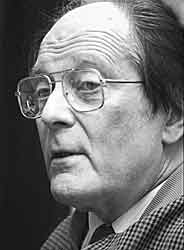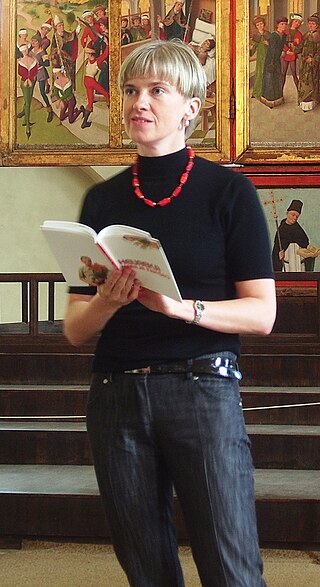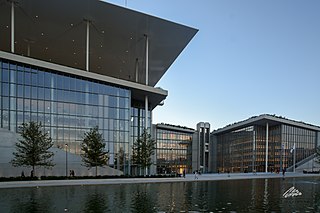Jan Kaus | |
|---|---|
 Kaus in 2010 | |
| Born | 22 January 1971 Aegviidu, Estonia |
| Occupation | Author |
| Notable works | Õndsate tund, Tema, Miniatuurid, Hetk |

Jan Kaus (born 22 January 1971) is an Estonian writer. [1]
Jan Kaus | |
|---|---|
 Kaus in 2010 | |
| Born | 22 January 1971 Aegviidu, Estonia |
| Occupation | Author |
| Notable works | Õndsate tund, Tema, Miniatuurid, Hetk |

Jan Kaus (born 22 January 1971) is an Estonian writer. [1]
Jan Kaus was born in Aegviidu and studied education and philosophy in Tallinn. In 1995, he took his teacher's examination.
Kaus currently works as poetry and prose writer and publicist. In addition, he also works as a literary critic, essayist, visual artist, guitarist and translator from English and Finnish. [2]
From 1998 to 2001 Kaus was the editor of the Estonian literary weekly Sirp . From 2004 to 2007 he was chairman of the Estonian Writers' Union (Estonian Eesti Kirjanike liit). Since 2007, he again worked at Sirp.
Jan Kaus is an accurate and shrewd, sometimes sarcastic observer of Estonia, the New Economy and the Internet age. His poetry and prose take up the social problems in Estonia in the 21st century.

William Francis Nolan was an American author who wrote hundreds of stories in the science fiction, fantasy, horror, and crime fiction genres.

Robert Hilles is a Canadian poet and novelist.

A literary genre is a category of literature. Genres may be determined by literary technique, tone, content, or length. They generally move from more abstract, encompassing classes, which are then further sub-divided into more concrete distinctions. The distinctions between genres and categories are flexible and loosely defined, and even the rules designating genres change over time and are fairly unstable.

Jaan Kross was an Estonian writer. He won the 1995 International Nonino Prize in Italy.

Lars Saabye Christensen is a Norwegian / Danish author.

Elo Viiding is an Estonian poet and prose writer.

Enn Vetemaa was an Estonian writer sometimes referred to as a "forgotten classic", as well as "the unofficial master of the Estonian Modernist short novel".

Jaak Urmet is an Estonian writer.

Estonian literature is literature written in the Estonian language Estonia leads the world in book ownership, on average Estonians own 218 books per house, and 35% own 350 books or more.

Klaus Ebner is an Austrian writer, essayist, poet, and translator. Born and raised in Vienna, he began writing at an early age. He started submitting stories to magazines in the 1980s, and also published articles and books on software topics after 1989. Ebner's poetry is written in German and Catalan; he also translates French and Catalan literature into German. He is a member of several Austrian writers associations, including the Grazer Autorenversammlung.

Vahur Afanasjev was an Estonian novelist, poet, musician and film director best known for his novel Serafima and Bogdan a story following the lives in a village of Russian Orthodox Old Believers on the shore of the lake Peipus from the end of the World War II to the nineties. The novel won the 2017 Estonian Writers' Union's Novel Competition.

Marina Anatolyevna Palei is a Russian-speaking Dutch writer, poet, and scriptwriter.
August Sang was an Estonian poet and literary translator. Sang was a member of the Arbujad literary group, which represented a new direction in Estonian poetry before the outbreak of World War II. He was known as a translator of poetry from German, Russian, French and Czech languages.

Mihkel Mutt is an Estonian writer, essayist, columnist and editor.

Otar Chiladze was a Georgian writer who played a prominent role in the resurrection of Georgian prose in the post-Joseph Stalin era. His novels characteristically fuse Sumerian and Hellenic mythology with the predicaments of a modern Georgian intellectual.

Maarja Kangro is an Estonian poet, short story writer, novelist, essayist, nonfiction writer and librettist.

Uido Truija is an Estonian lawyer and writer.

Modern Greek literature is literature written in Modern Greek, starting in the late Byzantine era in the 11th century AD. It includes work not only from within the borders of the modern Greek state, but also from other areas where Greek was widely spoken, including Istanbul, Asia Minor, and Alexandria.

Asko Künnap is an Estonian designer, writer, and artist.

Ellen Niit was an Estonian children's writer, poet and translator. Over her lifetime, she penned more than forty books of both prose and poetry for children. She also wrote a number of collections of prose and poetry for adults. Her works have been translated into eighteen languages.